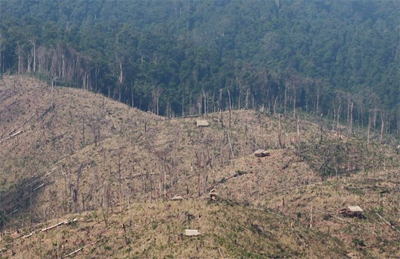|
|
Policies promoting industrial rubber plantations over traditional swidden, or slash-and-burn, agriculture across Southeast Asia may carry significant environmental consequences, including loss of biodiversity, reduction of carbon stocks, pollution and degradation of local water supplies, report researchers writing in Science.
Conducting field work in the Xishuangbanna prefecture of China’s Yunnan province and assessing broader regional trends, Alan Ziegler of the National University of Singapore and colleagues argue that policies favoring agricultural intensification over small-scale slash-and-burn have encouraged the rapid expansion of rubber plantations across more than 500,000 hectares (1,930 square miles) of montane forest in China, Laos, Thailand, Vietnam, Cambodia, and Myanmar. Despite widespread perception among authorities that “swidden cultivation is a destructive system that leads only to forest loss and degradation”, the researchers found that the transition to industrial plantations has not necessarily benefited the environment.
 Forest conversion for rubber plantations in Northern Laos in January 2009 |
“The uncontrolled expansion of rubber in China was encouraged in part because it was seen as a favorable alternative to swiddening,” the authors write. “Policies such as the Sloping Land Conversion Program supported the planting of rubber, because it counts as reforestation. Yet such policies have not always improved environmental conditions.”
They explain:
-
“In retrospect, it has become clear that the environmental impacts of traditional swiddening were inconsequential until mountain populations increased, cropping periods lengthened, and fallow periods became shorter, and the cultivation of opium as a cash crop proliferated after the Second World War. Recent intensification of permanent agriculture has had numerous negative environmental consequences: Erosion has accelerated and stream sediment loads have increased where repetitive cultivation is performed on steep slopes without appropriate conservation methods; permanent conversion of hill slopes and road building have increased the risk of landslides; irrigation of cash crops in the dry season has desiccated streams; and use of pesticides and fertilizers to sustain commercial agriculture has reduced water quality.”
While Ziegler and colleagues caution that more research is needed to determine the precise environmental impacts of plantation agriculture, they recommend boosting the amount of natural forest under protection and paying farmers in upland areas to keep their forests standing, preserving ecosystem services and biodiversity. The authors also suggest that governments implement policies to promote diversified agroforestry systems over monocultures.
Alan D. Ziegler, Jefferson M. Fox, and Jianchu Xu. The Rubber Juggernaut. 22 MAY 2009 VOL 324 SCIENCE
Related
China’s tropical rainforests decline 67% in 30 years March 3, 2008
Tropical rainforest cover in southern Yunnan decreased 67 percent in the past 30 years, mostly due to the establishment of rubber plantations, according to a new assessment of tropical forests in southwestern China. The study, published in the inaugural issue of the open access e-journal Tropical Conservation Science, reviewed species composition in China’s only tropical rainforest.
Monoculture tree plantations are “green deserts” not forests, say activists September 19, 2008
A number of environmental and social organizations have declared September 21st: International Day against Monoculture Tree Plantations to highlight the social upheaval and environmental degradation — including impacts on global biodiversity and climate change — wrought by industrial plantations.
Corporations become prime driver of deforestation, providing clear target for environmentalists August 5, 2008
The major drivers of tropical deforestation have changed in recent decades. According to a forthcoming article, deforestation has shifted from poverty-driven subsistence farming to major corporations razing forests for large-scale projects in mining, logging, oil and gas development, and agriculture. While this change makes many scientists and conservationists uneasy, it may allow for more effective action against deforestation.